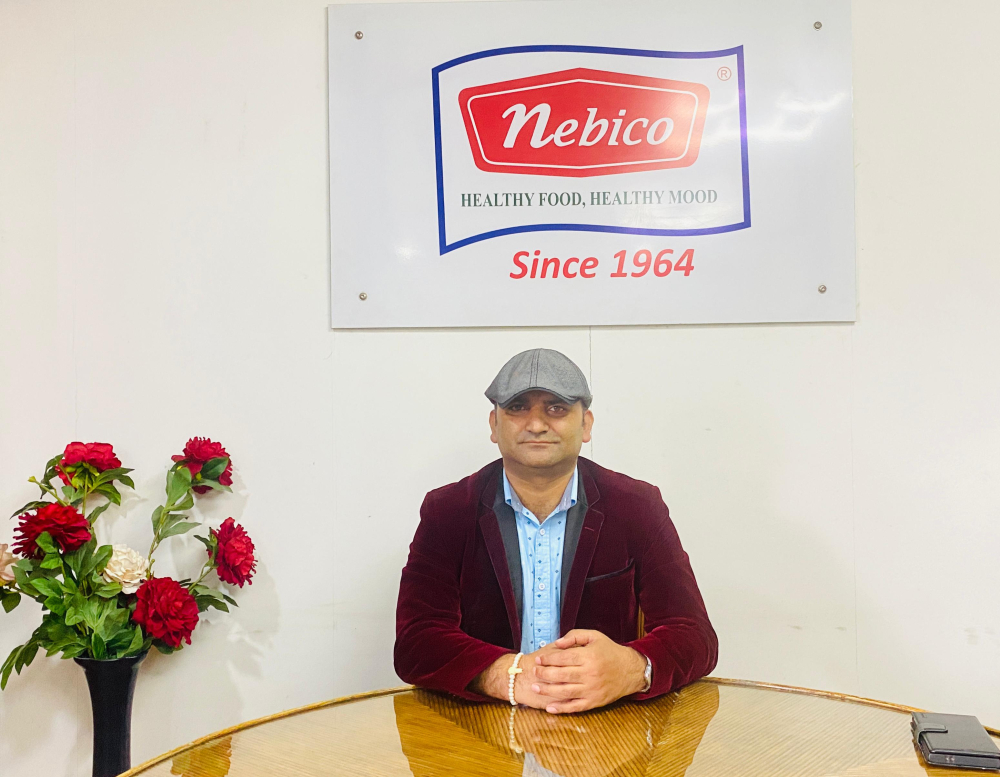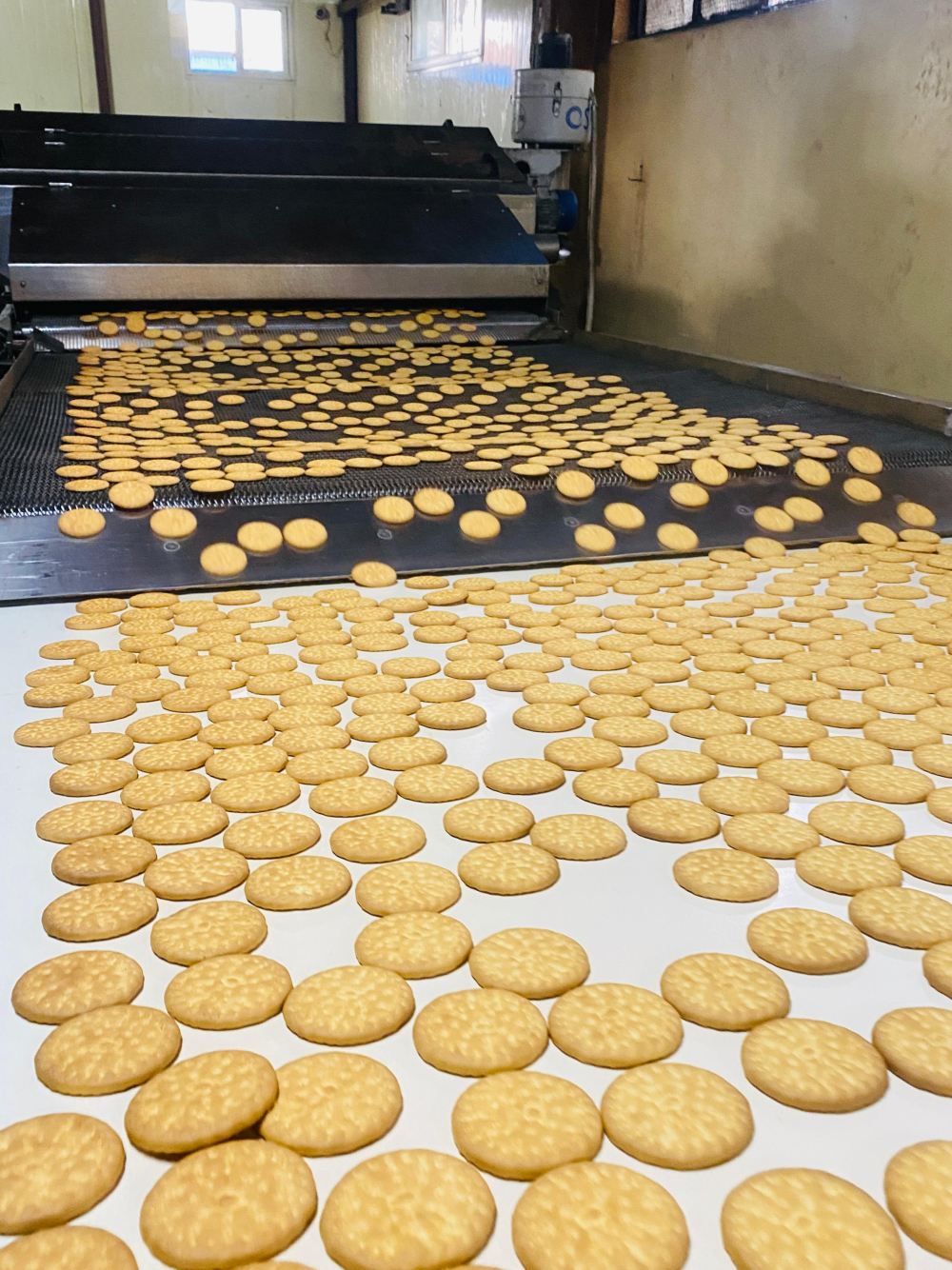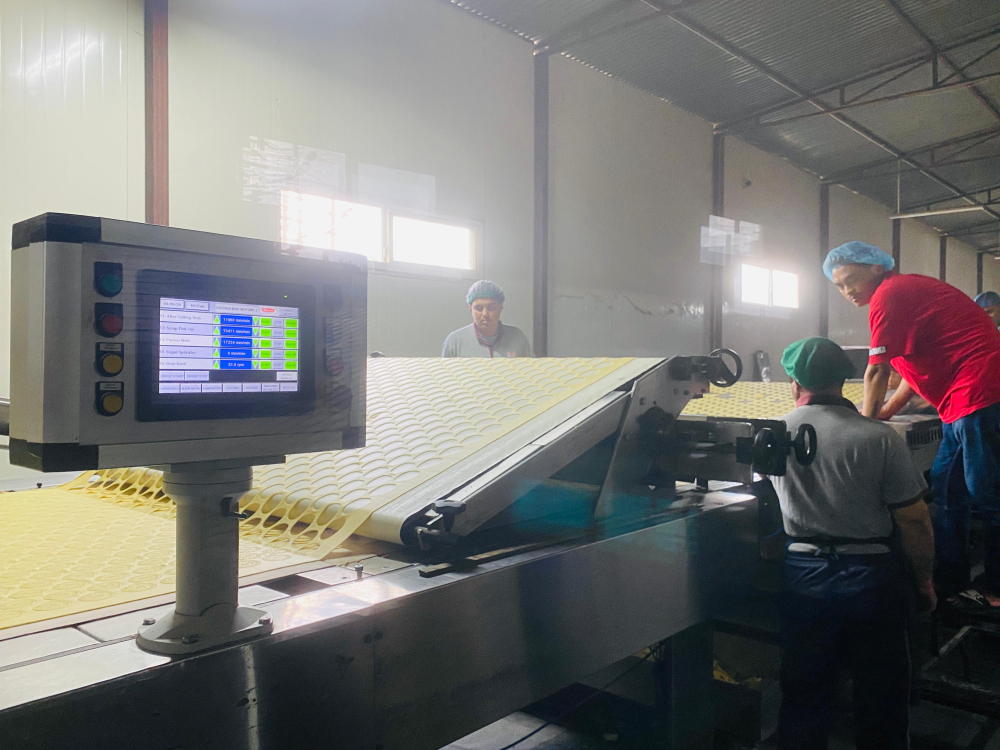
We use Google Cloud Translation Services. Google requires we provide the following disclaimer relating to use of this service:
This service may contain translations powered by Google. Google disclaims all warranties related to the translations, expressed or implied, including any warranties of accuracy, reliability, and any implied warranties of merchantability, fitness for a particular purpose, and noninfringement.

Highlights
- In a short period of time, Nebiko was revived and came to the market. Meanwhile, neither the company cut employees, nor the industry collapsed. Instead, it is on the journey of building a factory that can produce 1000 tons per month with an investment of 400 million in Hetaunda, Nebi, without being limited to one place and spreading its wings to other cities.
- The fire on 23 July 2078 was the saddest moment in the 60-year history of Nebi Biscuits. When the fire broke out in the factory in Balaju, Kathmandu, its workers came to the streets and cried profusely.



Nebiko is back. 'From Ashes...' means - Nebiko rose again from the ashes. A year after the factory was destroyed by fire, Biscuits and Confectionery manufacturing company Nabiko restarted production under this banner.

Nebiko's products, which were once popular in Nepal's homes, are now becoming popular again in a changed form and style. Facing various challenges, some of the company's products are "everyone's favourites". With the slogan 'Nebiko', he has been in constant discussion for 6 decades.
The fire on 23 July 2078 was the saddest moment in the 60-year history of Nebi Biscuits. When a fire broke out in a factory in Balaju, Kathmandu, the workers there stood on the street and cried profusely. Even during the corona epidemic, they responded that the company gave them a working environment by making proper security arrangements, and felt that their hearts were burning in the factory fire. The sight of the workers running overnight to gather at the factory after hearing the news of the fire at 2 am was truly touching. The company was completely damaged by the fire that continued for 11 hours.
 Homanath Neupane, Chief Executive Officer, NEBI
Homanath Neupane, Chief Executive Officer, NEBI
After a factory fire brought production to a standstill, there was confusion among employees and workers about NEBICO's future. Thinking that everything was destroyed, they were shocked. However, at that time there was a loss of around 26 million rupees. When there was a fire due to an electrical short circuit, the production stopped, the dealers turned away and even the consumers switched to other products. The company lost huge market share. The experience of Homanath Neupane, Chief Executive Officer (CEO) of Nebiko Biscuits, is that Tangrin is still exercising.
"Before the fire, we were number one in some products across the country, while we were leading in segments such as digestive, sugar free, but now due to the fire, we have fallen to the third/fourth number," says Neupane, "some of our varieties have disappeared." That was the most challenging time for us.'
However, like a phoenix rising from the ashes, Nebi's resurgence hit the market in no time. Meanwhile, neither the company cut employees, nor the industry collapsed. Rather, it is not limited to one place, but has spread its wings to other cities, and Nabi's expansion has been on a journey. The company is setting up a factory in Hetaunda that can produce 1000 tons per month with an investment of 40 million. Neupane says that currently 500 people are directly employed in the
company, while 8 to 9 thousand are indirectly employed. "Earlier, we used to produce only in Kathmandu, after the fire we opened a plant in Bhairahawa, brought new machines and started producing in large quantities, now we have the largest machine in Nepal," he said, "Because the machine is big, it has not been able to work at full capacity. Due to the economic recession, only 50 percent is being produced. According to him, NEBICO has been producing 30 tons of biscuits daily and they are sending products worth around 5 million rupees to the market.
From Glucose to Krum Krum Chiura
In the past, Nabiko only produced biscuits, but now it also produces confectionery, cereals, bakery, etc. Glucose, Snack Biscuits, Thin Arrowroot, Coconut, Butter Cookies, Saltino, Bites, Digestive Biscuits, Nebiko Raw Mangoes, Chocolates like Coolers and Chocolates, Muesli, Oats, Chips and Bakery dishes are also prepared. Even though the biscuit factories like Hulas, Gorkha, Far Food, Makwana, which were opened along with NEBICO, have been closed, NEBICO has been operating for 6 decades.
 Neupane claims that maintaining 'brand value' through consistent quality is the key to Nebiko's long-term success. "Even if the price of raw materials like sugar, milk, flour increases, we do not increase the price of our products arbitrarily," he said He said that some 'outlets' are kept and modifications are made according to the findings.
Neupane claims that maintaining 'brand value' through consistent quality is the key to Nebiko's long-term success. "Even if the price of raw materials like sugar, milk, flour increases, we do not increase the price of our products arbitrarily," he said He said that some 'outlets' are kept and modifications are made according to the findings.
However, although the company tries to maintain quality, Neupane says that some things are not under their control. He complained that some raw materials used to be produced in the country, but now when imported from abroad, sometimes they are inferior. "This is not only our problem, but the problem of all industries because sometimes wheat and other raw materials are not as good as expected," he said They complain that it is tasteless, smells bad, becomes powdery, and washes off.
An initiative of the then King Mahendra
Nebiko is considered as the oldest industry in Nepal. Its founders are Gorakh Bahadur Shrestha, Mahantlal Shrestha, Padma Vishmanand Vaidya. According to Neupane, this company was started at the initiative of the then King Mahendra. Although established in the year 2021, the industry has been operational since the year 2022. When it was registered in the year 2022 under the name of National Biscuit Company (NEBICO), there were no other noteworthy industries in Nepal except the Biratnagar Jute Mill.
Mahendra announced the establishment of an industrial zone and inaugurated the industrial zone in Balaju, Kathmandu in 2020. The former royal family still holds a major share of this company. 95 percent of the company's shares are owned by Raj Bahadur Singh's company and personally. He is its president. Singh is the daughter-in-law of Purvaraja Gyanendra. The remaining 5 percent shares are in the name of the founder promoter's family, Neupan revealed.
He claims that the value of the company which started with the same 5 percent investment equal to 80/82 lakh rupees has now increased almost 10 times. Biscuit companies like Gorkha, Hulas, which started with Nebiko, have closed down. Neupane remembers that there were 28 such companies in operation until about 10 years ago, but 10 of them have been closed. There are two/three reasons for this, if we look at India itself
 Around the same time, when biscuits started to be produced in large quantities through automatic technology, only large companies could survive, he said. The rest of the small companies were bought by big companies at very low prices.'
Around the same time, when biscuits started to be produced in large quantities through automatic technology, only large companies could survive, he said. The rest of the small companies were bought by big companies at very low prices.'
The investment in the company which started with around 80/82 lakh rupees has reached 25 crore rupees and it is the conclusion of Newpan that NEBI has been able to continue to move forward even when many biscuit industries were closed. "After the closure of some of the biscuit companies that were open for export, jobs and revenue were lost and the economy was also damaged," he said, adding that 17/18 industries are still operating. And, all of them are swedashi. We have survived in the market by competing with both domestic and foreign companies. The company claims that there are foreign-owned companies such as Parle, Britannia, and they are producing better products than multinational companies in terms of both quality and price. Neupane informed that the initiative to make
a public company has started to make Nebico a public company, which has been a private company since its inception. "Even though it will take some time to complete the process, we have started that effort because when a public company is made, it will be easier for financial processes including banking or loans," he said. As we are in the industrial area, we are currently unable to mortgage the land and after going public, only the shares can be mortgaged.'
Stating that he has his own land in the industrial areas of Bhairahwa and Hetaunda and a building has also been constructed in Hetaunda, he told the plan to start production in a year. He claims that the plant, which has a production capacity of 2 tons per hour, will have an annual turnover of 100 crores. Currently, the company plans to make its products, which are exported indirectly to countries like UK and Australia, direct and meet the necessary standards to export to other countries as well.
The challenges of the biscuit industry
Neupane said that there are many challenges to work in the industry sector in Nepal and the main among them are the interest rate policy and the banking system. "The interest rate of the bank has changed a lot and the rent rate of the land has been increased to apply even on the old date," he said He suggested that the government should promote and support companies like NEBICO.
He also criticized the situation of changing the policy overnight after the change of government and the new finance minister and governor. He complains that this trend is affecting not only NEBI but also the industrial sector and with the intention of raising more customs along with high taxes on raw materials, the industrialists are also suffering.
Public health issue
According to Neupane, another major challenge facing the biscuit industry in recent days is the rumor that people get sick after eating biscuits or that they are harmful to health. Neupane says that this problem has arisen when some doctors, nurses and other health workers or Babaji who have not studied anything about food science talk about it. "There is an example of the banning of biscuits made by Ramdev Baba's company. It is wrong to say that people should not eat biscuits when they are suffering from hunger or lack of food," he said. '
Neupane claimed that sugar-free biscuits are available even for diabetic patients, saying that eating too much of any food spoils it and that it is wrong. He also alleged that one packet of biscuits daily does not harm health and people who do not have much knowledge of food science spread more negativity about it.
While looking at opportunities for market growth inside and outside Nepal, Neupane also told Neupane that Nebiko plans to prepare herbal products, including Oreo, that can be consumed by patients with diseases such as high blood pressure and diabetes. 'We are moving new products with vitamins, minerals,' he said, 'we are also thinking of upgrading the biscuit material and extending its expiry date.' It was Neupane's admission that that status was due to non-registration and lack of originality. He said that he is also studying the subject of patent registration.
Lessons taught by the fire
The fire that happened three years ago taught them a lesson that they should not keep all the infrastructure in one place and decentralize the production. Neupane says that the company's experience is that the market will not be affected if it is produced in separate places and it will be easy to reduce the losses. "Due to the fire, our important machines were burnt and our damage was not covered by the insurance," he said It was the saddest moment in the 60-year history of Nebi Biscuits, when a fire broke out in the factory in Balaju, Kathmandu, its workers came to the streets and cried profusely
 प्रकाशित : भाद्र २३, २०८१ ०८:२९
प्रकाशित : भाद्र २३, २०८१ ०८:२९

 २२.१२°C काठमाडौं
२२.१२°C काठमाडौं














